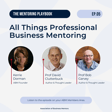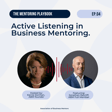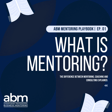
AI in Business Mentoring
In this Mentoring Playbook episode, ABM founder Kerrie Dorman discusses exciting advancements in three AI spaces with expert guest Cian Duggan, founder and CEO of Applied Insights AI.
Key themes include:
- AI Evolution and Small Business Implications
- How to use AI tools to optimise processes
- AI: Threats and Opportunities for SMEs
- Enhancing SME Operations with AI Tools
- Key AI Insights for Mentors and Mentees
- About FindingInsights A
About Applied Insights AI
At Applied Insights, we know leadership is evolving, and we’re here to empower leaders to navigate today’s complex, exponential world. Using leading cognitive science, AI-powered tools, and a vibrant community of business leaders, we provide real-time insights and tailored coaching that help leaders make informed decisions and scale their organizations with confidence.
Our goal is to enhance decision-making, improve team connectivity, and drive sustainable growth, supporting leaders at every stage of their journey. Whether you’re a new CEO or a seasoned executive, Applied Insights equips you with the insights, solutions and network to thrive in uncertainty and lead with clarity.





